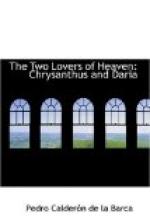is in the least obscure. Faith, Hope, Charity,
the Five Senses, Heresy, Judaism, Paganism, Atheism,
and the like, which in inferior hands must have been
mere lay figures, are there instinct with a dramatic
life and energy such as beforehand I could hardly
have supposed possible. Moreover, in spite of
Dr. Lorinzer’s odd encomiums, each allegory as
it rises is more neatly rounded off, and shows a finer
grain, than any of the personifications of Spenser;
so that the religious effect and the theological effect
intended by the writer, are both amply produced—yes,
produced upon us, his heretical admirers. Hence,
even if there be mysterious treasures of beauty below
the surface, to which we aliens must remain blind for
ever, this expression, which broke from the lips of
one to whom I was eagerly reading [Mr. Mac-Carthy’s
translation of] the play, ’Why, in the original
this must be as grand as Dante’, tends to show
that such merits as do come within our ken are not
likely to be thrown away upon any fair-minded Protestant.
Dr. Newman, as a Catholic, will have entered, I presume,
more deeply still into the spirit of these extraordinary
creations; his life, however, belongs to a different
era and to a colder people. And thus, however
much he may have been directed to the choice of a
subject by the old Mysteries and Moralities (of which
these Spanish Autos must be taken as the final development
and bright consummate flower), he has treated that
subject, when once undertaken by him, entirely from
his own point of view. ‘Gerontius’
is meant to be studied and dwelt upon by the meditative
reader. The Autos of Calderon were got ready
by perhaps the most accomplished playwright that ever
lived, to amuse and stimulate a thronging southern
population. ‘Gerontius’ is, we may
perhaps say for Dr. Newman in the words of Shelley,
’The voice of his own soul
Heard in the calm of thought’;
whilst the conceptions of the Spanish dramatist burst
into life with tumultuous music, gorgeous scenery,
and all the pomp and splendour of the Catholic Church.
No wonder therefore that our English Auto, though
composed with the same genuine purpose of using verse,
and dramatic verse, to promote a religious and even
a theological end, should differ from them in essence
as well as in form. There is room however for
both kinds in the wide empire of Poetry, and though
Dr. Newman himself would be the first to cry shame
upon me if I were to name him with Calderon even for
a moment, still his Mystery of this most unmysterious
age will, I believe, keep its honourable place in
our English literature as an impressive, an attractive,
and an original production”—pp. 109,
115.
I may mention that the volume containing Belshazzar’s
Feast, and The Divine Philothea, the Auto particularly
referred to by Sir F. H. Doyle, has been called Mysteries
of Corpus Christi by the publisher. A not inappropriate
title, it would seem, from the last observations of
the distinguished Professor. A third Auto, The
Sorceries of Sin, is given in my Three Plays of Calderon,
now on sale by Mr. B. Quaritch, 15 Piccadilly, London.
The Divine Philothea, The Sorceries of Sin, and Belshazzar’s
Feast are the only Autos of Calderon that have ever
been translated either fully, or, with one exception,
even partially into English.




